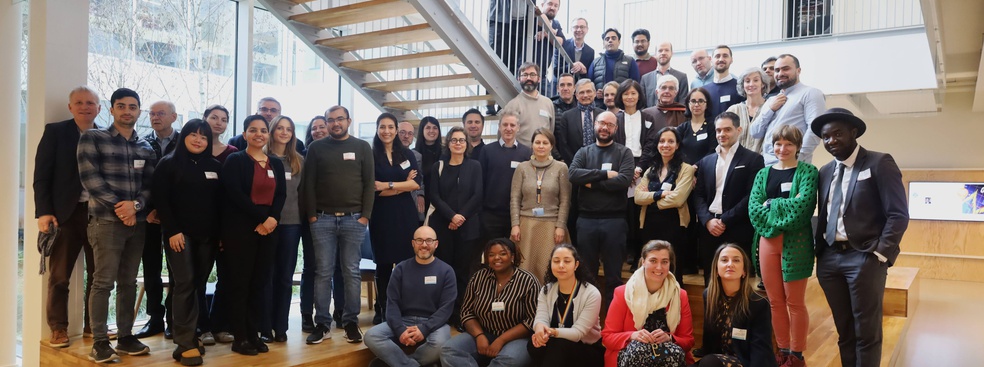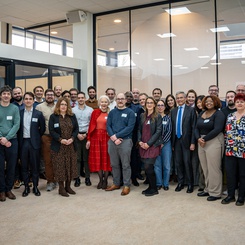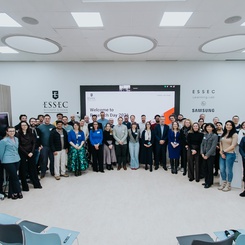ESSEC Business School is a research hotspot, with 194 professors conducting cutting-edge research in management, data analytics, artificial intelligence, economics, finance, and more. On February 6th, 2025, the ESSEC Research Centre held the third annual Research Day, a day-long conference dedicated to sharing this research.
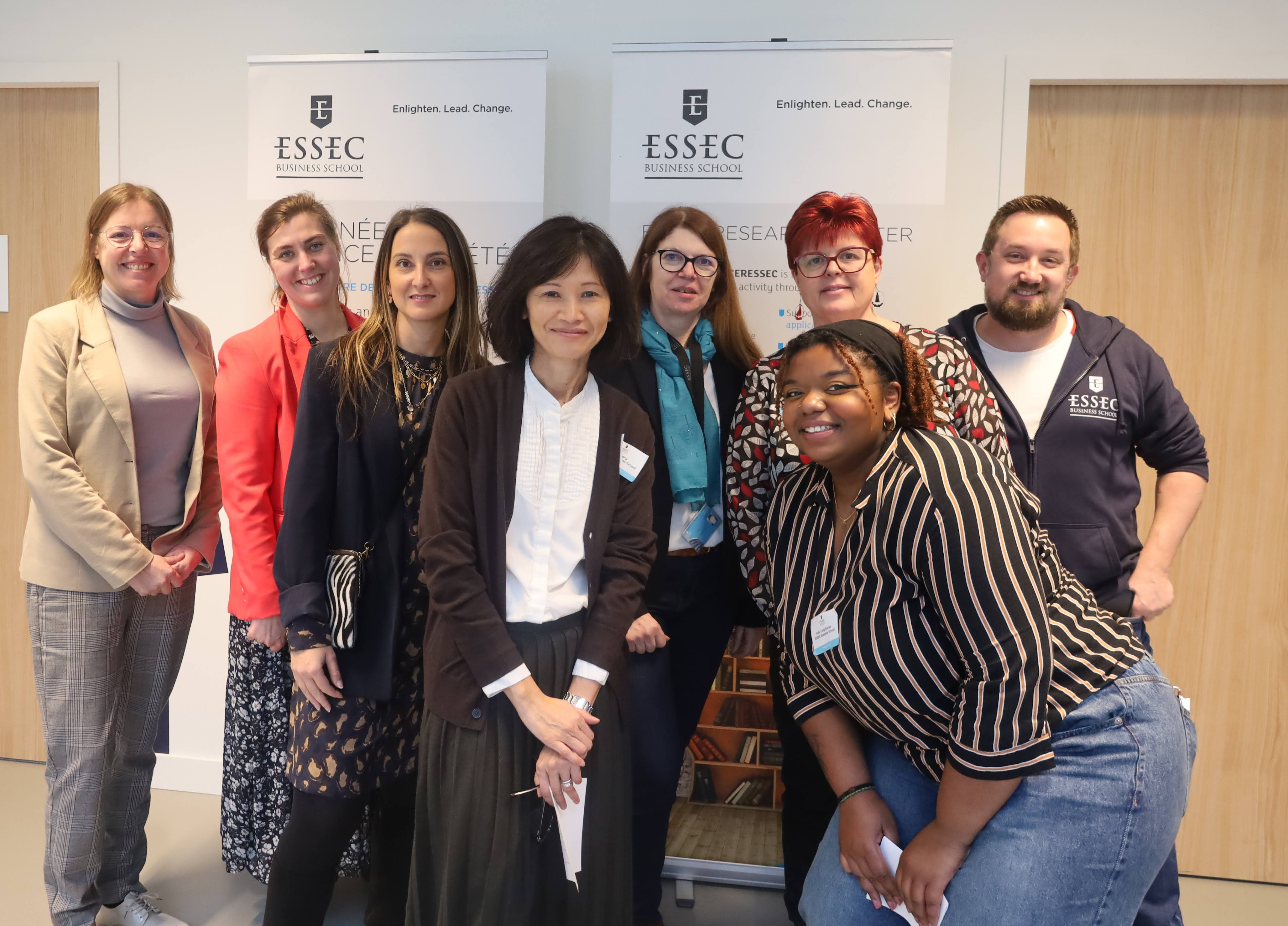
Research Day is designed to bring together professors and researchers across different departments to discuss their ongoing projects, get feedback from colleagues, and brainstorm ideas and future collaborations. This year’s edition included presentations from over a dozen ESSEC faculty members in France and Singapore, a PhD poster session, a roundtable discussion and a presentation from a guest speaker from MIT Sloan Management Review. Ha Hoang, Associate Dean of Research, notes, “It is a wonderful showcase of our ongoing research and underscores how energizing it can be to bring people and ideas together across our campuses.”
Academic presentations
Data Rules: Reinventing the Market Economy
Cristina Alaimo, Associate Professor, Information Systems, Data Science & Operations
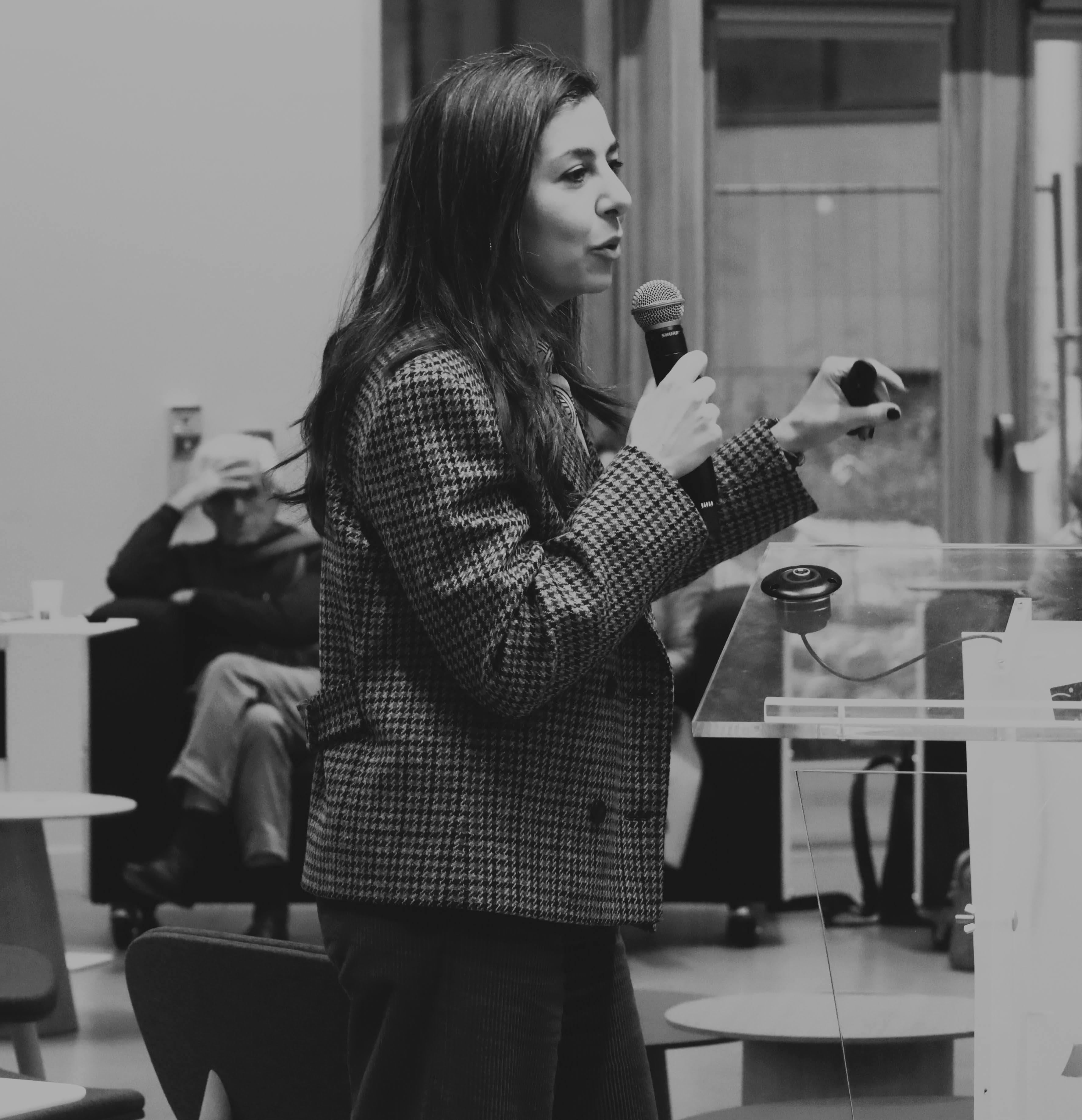
Dr. Alaimo built on a few ideas from her book “Data Rules: Reinventing the Market Economy”. The book traces the social history, economic motives, and technological evolution behind the data revolution and associates it with current economic and organizational transformations. The functional logic of traditional markets and organizations differs from the rules of data production, which consists prevalently of endless exchanges and interactions. She examined the functions that data perform in contemporary institutional contexts in some detail and linked these functions to the diffusion of platforms and ecosystems as they become the forms of organizing that mark our time.
The untold story of PwC Europe: the UK patent box and Schäuble’s uneven battle against abusive tax avoidance
Anastasios Elemes, Associate Professor, Accounting and Management Control
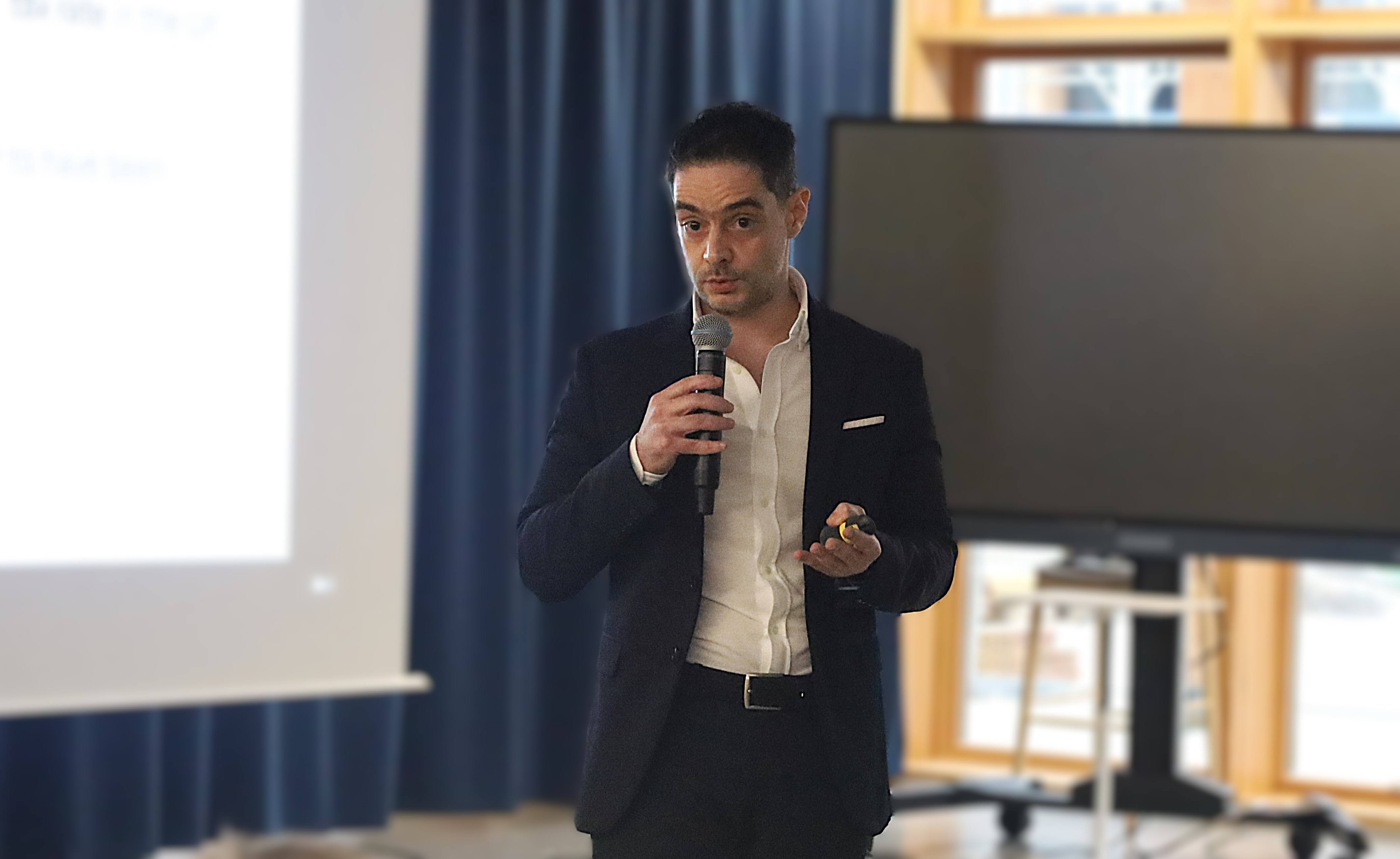
Pressure on Belgium's preferential tax regime was mounting when, in April 2013, the UK legally introduced a highly beneficial patent box. A month later, PwC Netherlands entered PwC Europe, a newly-formed German-led alliance between PwC Germany and PwC Austria. The alliance harmonized partner remuneration systems across its members in July 2013. Shortly after, PwC Belgium agreed to join the alliance, legally entered in 2014. In this paper, we examine the implications of PwC Europe's formation for client-firm tax planning in the changing European tax-planning landscape. Using a difference-in-difference research design, we find that multinational corporation (MNC) affiliates audited by alliance members more extensively reorganize their income shifting activities to exploit the UK patent box relative to other MNC affiliates. More detailed tests show that treatment affiliates more actively relocate intangible and financial assets and shift operating and financial income to UK PwC-audited MNC affiliates. We also provide evidence consistent with dividends repatriating from the UK to Germany and Belgium through the Netherlands for treatment affiliates after PwC Europe's formation. Our study is the first to offer direct insights into a major European cross-border tax planning transition of the 2010s, and the importance of advisory firms' internal structures for client-firm tax planning.
The Media and Foreign Powers: Does Market Access Matter for News Reporting?
Li Han, Associate Professor, Economics

Does the news media’s coverage of autocracies hinge on their relationship with those regimes? Exploiting a large-scale media crackdown in May 2019 in China, in which multiple influential UK- and US-based news sites were blocked, we find that news outlets adopted a more negative tone in coverage of China and reported more frequently on sensitive topics such as human rights after being blocked, compared to those with no access change. Such effects are absent in news on economic topics and opinion articles. This set of findings can be organized by the interpretation that the media censored themselves less after losing access. We also investigate various other potential mechanisms that might contribute to the observed changes, such as the reallocation of journalistic resources and shifts in readership composition.
Geopolitical Liability of Foreignness and Global Strategy
Srividya Jandhyala, Associate Professor, Management

We introduce the geopolitical liability of foreignness (LOF) whereby a multinational firm is perceived unfavorably by host country stakeholders because its home country is a geopolitical rival. To reshape perceptions of national origin, the firm can relocate control rights outside of the home country by: (a) moving its headquarters and senior leadership to a friendly country, (b) transferring ownership and control of host country operations to a local partner, (c) shifting the supply chain to the host market. Using a “lab in the field” experimental design, and focusing on customer behavior, we find that only the first two of these relocation strategies help overcome geopolitical LOF as they effectively decrease potential customers’ identification of the firm with its home country and increase their willingness to buy the firm’s products.
Divestment From Fossil Fuels: Evidence From Ownership Data
Alain Naef, Assistant Professor, Economics

There is a lot of talk about fossil divestment. Is there any action? We built a new database on investor divestment based on ownership data. Instead of focusing on prices, we look at the actual ownership of investors. Our database contains 30 million investor positions in the 312 largest fossil fuel companies. We show that certain religious organizations, universities and public organizations divested from fossil fuel. Looking at all large investors, we find a heterogeneous behavior between short- and long-term divestment. Using a Structural Vector Autoregression (SVAR) and a Vector Error Correction model (VECM) both resulting from behavioral assumptions, we find that commodity price returns are the major drivers of short-term divestment and environmental and climate policy likelihood exhibit a cointegration relationship with long-term divestment. It shows that investors react strongly to fluctuations in the market energy prices in the short term. Only very few investors adjust their fossil fuel holdings in the long term, considering the risk of climate and environmental policy implementation.
Pure momentum
Roberto Reno, Professor, Information Systems, Data Science & Operations

Momentum, one of the strongest and most comprehensively studied trading strategies, bets on the persistence of past trends. The trend is traditionally measured by the cumulative past returns of individual stocks. However, the historical cumulative return can be a noisy proxy for the past trend, especially for those stocks with high volatility. We apply a test to detect the presence of drift in the stock returns in the formation period eliminating the impact of volatility. We show that the profit of standard momentum is mainly attributable to holding return of stocks with a non-negligible drift. We also discover that our pure momentum strategy, which is based on the strength of the drift, outperforms the traditional momentum strategy with stronger and more persistent holding returns. Moreover, the transaction cost of pure momentum is much lower than that of traditional momentum.
NGO Activism: Exposure vs Influence
Victor Saint Jean, Assistant Professor, Finance

We analyze the timing of NGO campaigns to shed light on NGOs’ objectives and how their strategies evolve over time. Using data from 2,500 campaigns, we find that NGOs are six times more likely to launch campaigns on their target’s Annual General Meeting (AGM) date. Although this strategy increases media exposure and stakeholder scrutiny, resulting in consumer boycotts and related shareholder proposals at the following AGM of the targeted firm, it has no impact on current AGM votes. As NGOs build reputational capital, they adjust their timing to influence AGM votes, revealing the trade-offs they face to drive corporate change.
Learning to Disclose: Disclosure Dynamics in the 1890s Streetcar Industry
Robert Stoumbos, Associate Professor, Accounting & Management Control

We study the influence of bounded rationality on companies’ disclosure to investors in new industries. Using a historical example of a new industry, we document that several companies initially withheld their earnings, despite external capital needs and investor information demands. However, almost all these companies started disclosing shortly thereafter. Interpreted through the lens of a disclosure model featuring level-k thinking, these patterns suggest that limited strategic thinking of some companies contributed to the initial failure to disclose, while feedback and learning over time contributed to the quick convergence to an equilibrium of (almost) full disclosure in the new industry.
Complementarity in Future Selves: How Networks of Aspirations Shape Proactive Career Behavior
Karoline Strauss, Professor of Management
.png)
When thinking about their career, individuals rarely hold a single, cohesive vision of their future selves. Instead, they may imagine a wide range of possibilities and have different aspirations for who they might become. This research explores how future self complementarity – the extent to which the aspirations a person has for their future self are mutually reinforcing – affects their ability to manage their career.
We conceptualize the future self as a network of interconnected cognitive representations and propose that complementarity within this network enhances motivation by amplifying the energizing effects of these future-oriented representations. Across five studies, we examine this idea and develop a network-based measure of future self complementarity.
Our findings show that individuals with highly complementary future selves are more likely to engage in proactive career behavior (e.g., taking initiative to develop skills). These effects are driven by increased vitality—feeling energized and motivated to act. For example, in a longitudinal study of employees across 11 organizations, we found that complementarity indirectly boosted proactive career behavior by enhancing vitality.
This research challenges traditional assumptions that a clear and singular career vision is essential for success. Instead, it highlights the value of embracing a flexible, interconnected view of the future. By identifying complementarity as a critical factor and providing tools to measure it, we contribute to career development, identity, and organizational behavior research, with implications for both theory and practice.
Machine Learning Guided Optimization for Demand Responsive Transport Systems
Emiliano Traversi, Associate Professor, Information Systems, Data Analytics & Operations

Most of the time, objective functions used for solving static combinatorial optimization problems cannot deal efficiently with their real-time counterparts. It is notably the case of Shared Mobility Systems where the dispatching framework must adapt itself dynamically to the demand. More precisely, in the context of Demand Responsive Transport (DRT) services, various objective functions have been proposed in the literature to optimize the vehicles routes. However, these objective functions are limited in practice because they discard the dynamic evolution of the demand. To overcome such a limitation, we propose a Machine Learning Guided Optimization methodology to build a new objective function based on simulations and historical data. This way, we are able to take the demand’s dynamic evolution into account. We also present how to design the main components of the proposed framework to fit a DRT application: data generation and evaluation, training process and model optimization. We show the efficiency of our proposed methodology on real-world instances, obtained in a collaboration with Padam Mobility, an international company developing Shared Mobility System
Thank you to session chairs Richard McFarland, Pooyan Khashabi, Maciej Workiewicz, and Gorkem Celik!
Round table
Connecting to companies for research: Experiences and opportunities
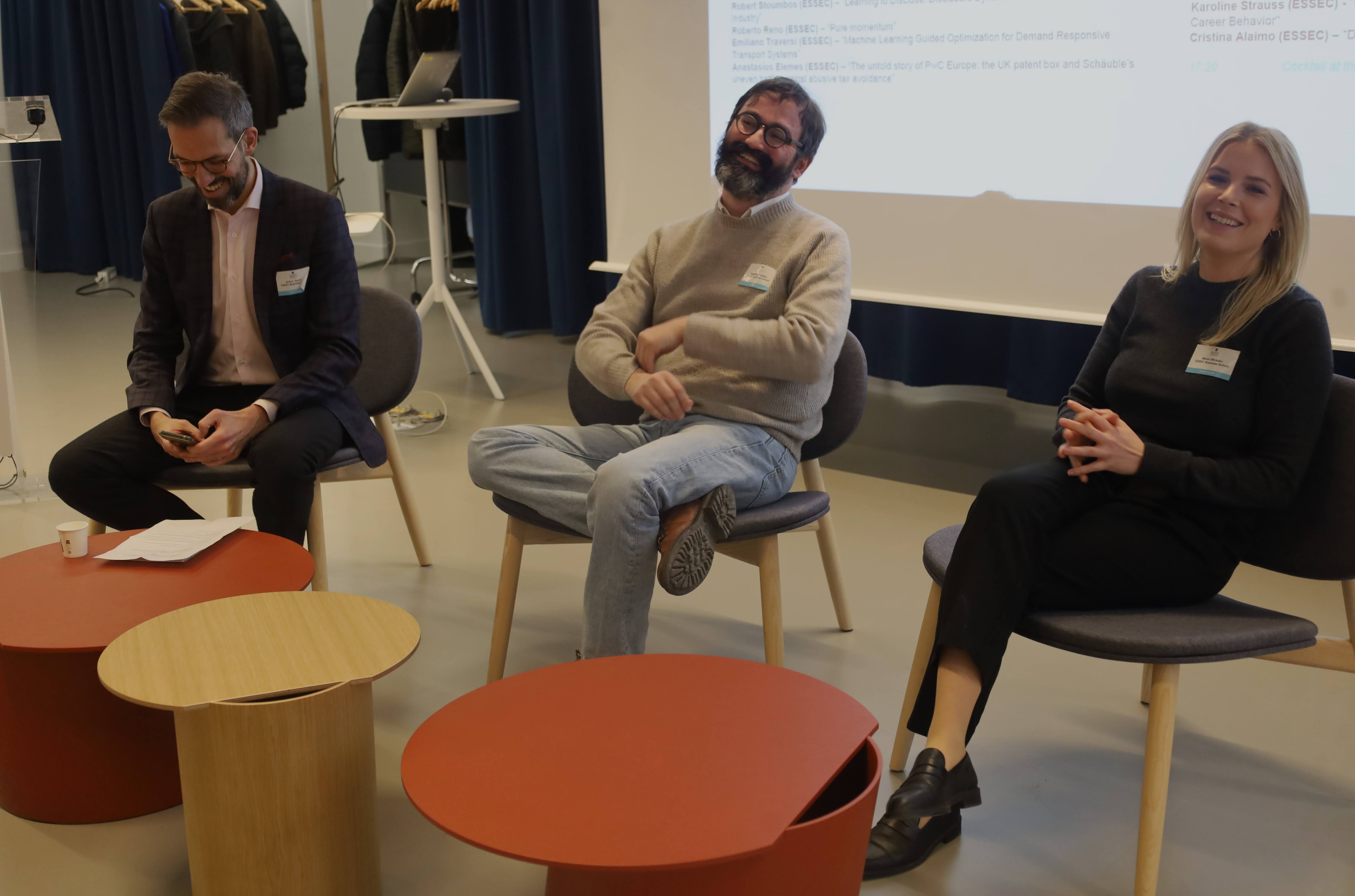
In this discussion chaired by Arthur Gautier (Public & Private Policy), ESSEC professors Maren Mickeler (Management), Xavier Lambin (Economics) and Emiliano Traversi (Information Systems, Data Science & Operations) shared their experiences in conducting research within companies. They shared their advice on how to make contact with companies and how to show them that participating in research is worthwhile.
PhD Poster Session
Eighteen current ESSEC doctoral students presented their research during a poster session, on topics ranging from entrepreneurship, public policy, artificial intelligence, and more. Following a vote by professors in attendance, Dr. Arnaud de Bruyn, director of the PhD program and professor of marketing, presented the awards to:
Best poster design: Abhay Bhargava, “The story of a gold fish’s attention & the lost glory of A.I. driven first mile personalization”
Best poster content: Yaroslav Prokhorskoy, “Beneath the Ban of Abortion: Evidence from the USSR”
Best presentation/speech: Rachel Paya, “Do Subsidies to Green Technical Change Reduce Carbon Emissions? Evidence from French Manufacturing Firms”
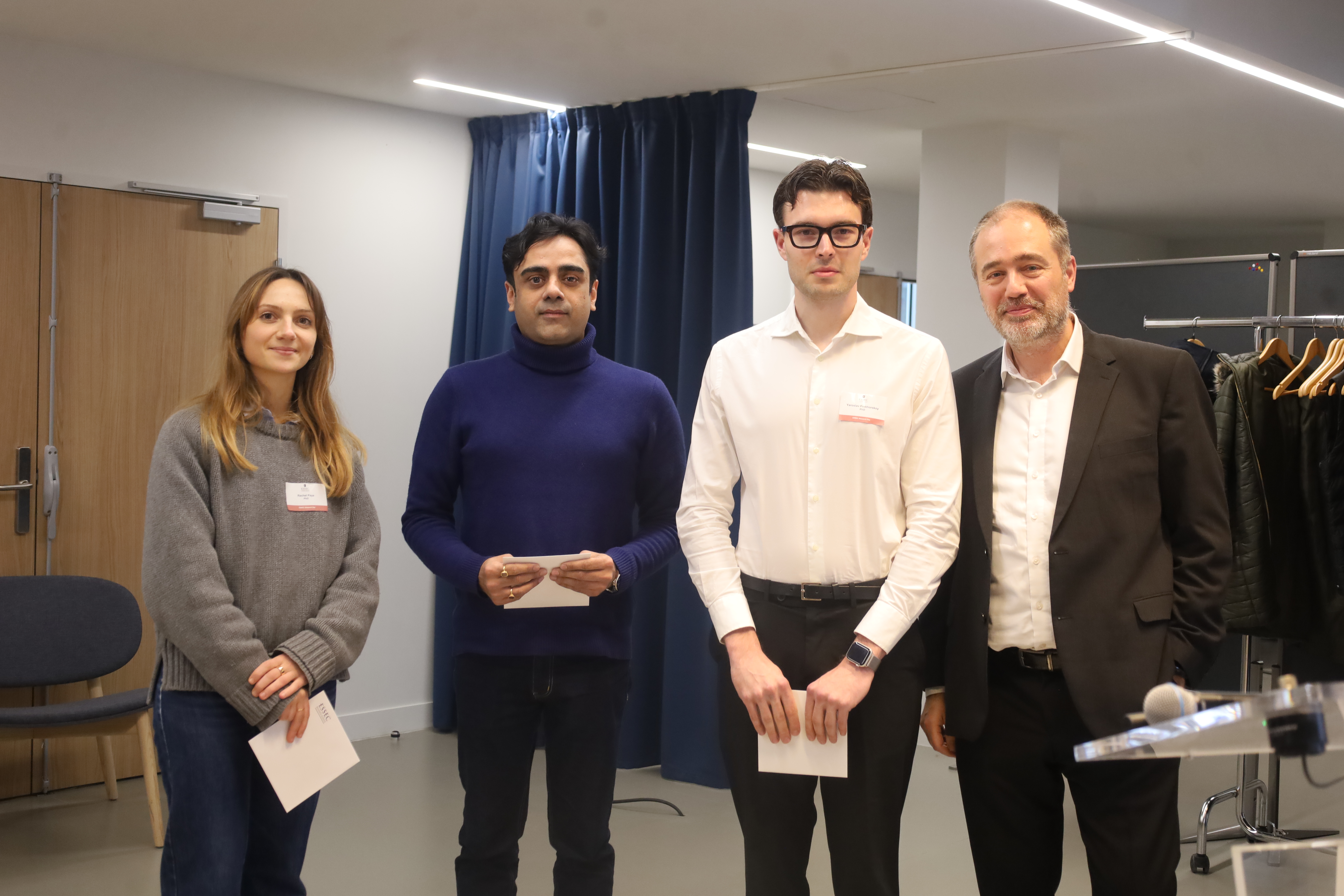
Invited talk: "How to write for managers: Translating research for impact on practice."
Abbie Lundberg, Editor-in-chief, MIT Sloan Management Review
The dissemination of knowledge is a key value at ESSEC, and a prominent component of the Transcend strategy. To that end, Ha Hoang facilitated a discussion with Abbie Lundberg who shared insights on the business leaders who constitute the readership of Sloan Management Review in order to help researchers better understand their interests, challenges, and the types of content that resonate most with them.
See you next year for the 2026 edition!
